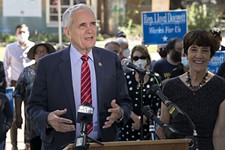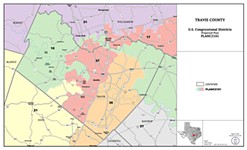Redistricting: Unsavory Stew
What's on Austin's redistricting menu?
By Lee Nichols, Fri., March 4, 2011
As predicted last year by the Texas Legislative Council (see "Painting by Numbers," Jan. 28), most of the growth occurred along the I-35 corridor and in Houston suburbs, while many West Texas counties not only lagged behind but are in some cases depopulating.
Lawmakers must balance the populations among the districts so that they're roughly equal. That means some of those West Texas districts must become geographically huge in order to take in enough people while those in the middle of the state must physically shrink. That will be more complicated for congressional maps, because the Texas delegation will expand from 32 seats to 36 – the greatest increase in the nation.
The effects will be felt especially strongly in the Austin area: Of the five most overpopulated congressional districts, three represent Austin, led by Michael McCaul's District 10, which will have to lose 282,879 people to approach the ideal size of 698,488. Similarly, Jeff Wentworth's District 25 (which includes southern Travis County) is the third most overpopulated of the 31 Senate districts, while Districts 20 and 52 (both Williamson County) are in the top 16 state House districts (out of 150), and the two largest State Board of Education districts are Districts 5 (which includes Travis County south of the river) and 10 (Travis north of the river).
The Republican-dominated Legislature will no doubt try to preserve its majorities, but it will be tough to keep them quite as large as they are now: 89% of Texas' new growth is attributed to non-Anglos, and 65% is Latinos, who traditionally vote Democratic. Matt Angle of the Lone Star Project argues that in order to undo the damage done by the Tom DeLay-driven re-redistricting of 2003, all four of the new congressional seats would have to be drawn to empower Latinos or nonwhites.
One potential scenario is that no maps will come out of the Lege at all, as Republicans might decide instead to punt the issue to the all-Republican Legislative Redistricting Board (composed of the lieutenant governor, speaker of the house, attorney general, comptroller, and land commissioner) rather than negotiate with the Democratic minority.
Got something to say on the subject? Send a letter to the editor.










